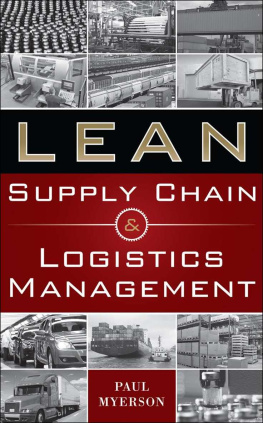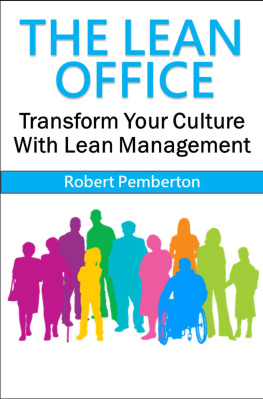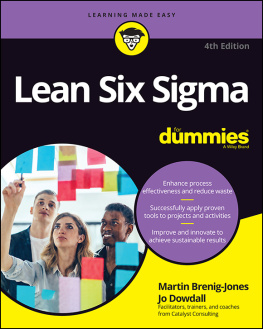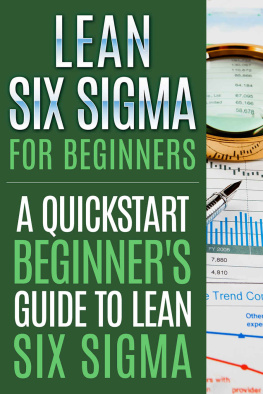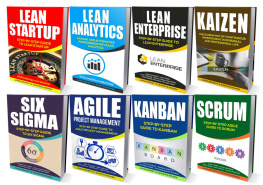Praise for Lean Supply Chain and Logistics Management, by Paul Myerson
The Author has provided us with a comprehensive and thorough examination of Lean principles applied to improving the efficiency and effectiveness of supply chains and logistics. Managers who may have felt overwhelmed with the challenges and complexities of logistics and supply chain management in todays global environment will benefit from Paul Myersons discussion of Lean. He has presented the material in an easy-to-understand style, and he addresses the basics as well as the advanced dimensions of Lean Management. He provides perspectives and insights which will add to the understanding of the power of Lean not only for those with limited exposure but also for those with experience in the area. His own experience and understanding is reflected in his discussion of Lean tools and the methodology for implementation of the Lean approach. The documented benchmarks for success and the many examples help explicate the complexities for the reader.
The book is organized and written so that it will be useful as an introduction to the field and also as a reference when special challenges arise for the practicing manager. The chapter on metrics and measurements should be particularly useful, as well as the chapter discussing global supply chains. The book was written primarily for managers in the field, but it could be a valuable resource for a collegiate level course or a professional workshop. Paul Myersons book is a valuable contribution to Logistics and Supply Chain Management at an important time for companies facing the competitive challenges of the current global economy.
DR. JOHN J. COYLE
Professor Emeritus of Logistics and Supply Chain Management
Department of Supply Chain and Information Systems Smeal College of Business
Pennsylvania State University
University Park, Pennsylvania
Supply chain and logistics management are more and more a driving force in the marketplace. Paul Myersons 30+ years of experience as a manager, consultant, and teacher are very effectively put to use in his book that shows readers how to make things happen instead of wondering what happened.
Myerson provides readers with an orderly framework for achieving, maintaining, and improving a supply chains competitiveness. With the consumer in mind, the emphasis is on continually eliminating non-value adding activities in a supply chain so that the buyer gets true value for the price paid.
To realize the benefits of a lean supply chain and logistics management takes the right frame of mind and organizational culture combined with the use of appropriate concepts, tools, and use of evolving information technologies as presented in Myersons book.
WILLIAM DEMPSEY
The book is a must read for all supply chain managers seeking to drive down costs and improve profits. Get copies for your controller and all senior managers before any investment is made in your supply chain. This book lays it all out. Whether new or senior to the management of a supply chain, I strongly recommend this book.
RICHARD LANCIONI
Chair, Marketing & Supply Chain Management
Fox School of Business
Temple University
Philadelphia, Pennsylvania
About the Author
Paul Myerson has been a successful change catalyst for a variety of clients and organizations of all sizes. He has more than 25 years of experience in supply chain strategies, systems, and operations that have resulted in bottom-line improvements for companies such as General Electric, Unilever, and Church and Dwight (Arm & Hammer). Myerson holds an MBA in Physical Distribution from Temple University and a BS in Logistics from The Pennsylvania State University. He is currently Managing Partner at Logistics Planning Associates, LLC, a supply chain planning software and consulting business ( www.psiplanner.com ). Myerson serves as an adjunct professor at several universities, including Kean University and New Jersey City University. He is the author of a Windows-based Supply Chain Planning software, and co-author of a new Lean supply chain and logistics management simulation training game by ENNA ( www.enna.com/lean_supplychain/ ).


Copyright 2012 by The McGraw-Hill Companies, Inc. All rights reserved. Except as permitted under the United States Copyright Act of 1976, no part of this publication may be reproduced or distributed in any form or by any means, or stored in a database or retrieval system, without the prior written permission of the publisher.
ISBN: 978-0-07-176627-2
MHID: 0-07-176627-8
The material in this eBook also appears in the print version of this title: ISBN: 978-0-07-176626-5, MHID: 0-07-176626-X.
All trademarks are trademarks of their respective owners. Rather than put a trademark symbol after every occurrence of a trademarked name, we use names in an editorial fashion only, and to the benefit of the trademark owner, with no intention of infringement of the trademark. Where such designations appear in this book, they have been printed with initial caps.
McGraw-Hill eBooks are available at special quantity discounts to use as premiums and sales promotions, or for use in corporate training programs. To contact a representative please e-mail us at bulksales@mcgraw-hill.com.
Information contained in this work has been obtained by The McGraw-Hill Companies, Inc. (McGraw-Hill) from sources believed to be reliable. However, neither McGraw-Hill nor its authors guarantee the accuracy or completeness of any information published herein, and neither McGraw-Hill nor its authors shall be responsible for any errors, omissions, or damages arising out of use of this information. This work is published with the understanding that McGraw-Hill and its authors are supplying information but are not attempting to render engineering or other professional services. If such services are required, the assistance of an appropriate professional should be sought.
TERMS OF USE
This is a copyrighted work and The McGraw-Hill Companies, Inc. (McGraw-Hill) and its licensors reserve all rights in and to the work. Use of this work is subject to these terms. Except as permitted under the Copyright Act of 1976 and the right to store and retrieve one copy of the work, you may not decompile, disassemble, reverse engineer, reproduce, modify, create derivative works based upon, transmit, distribute, disseminate, sell, publish or sublicense the work or any part of it without McGraw-Hills prior consent. You may use the work for your own noncommercial and personal use; any other use of the work is strictly prohibited. Your right to use the work may be terminated if you fail to comply with these terms.
THE WORK IS PROVIDED AS IS. McGRAW-HILL AND ITS LICENSORS MAKE NO GUARANTEES OR WARRANTIES AS TO THE ACCURACY, ADEQUACY OR COMPLETENESS OF OR RESULTS TO BE OBTAINED FROM USING THE WORK, INCLUDING ANY INFORMATION THAT CAN BE ACCESSED THROUGH THE WORK VIA HYPERLINK OR OTHERWISE, AND EXPRESSLY DISCLAIM ANY WARRANTY, EXPRESS OR IMPLIED, INCLUDING BUT NOT LIMITED TO IMPLIED WARRANTIES OF MERCHANTABILITY OR FITNESS FOR A PARTICULAR PURPOSE. McGraw-Hill and its licensors do not warrant or guarantee that the functions contained in the work will meet your requirements or that its operation will be uninterrupted or error free. Neither McGraw-Hill nor its licensors shall be liable to you or anyone else for any inaccuracy, error or omission, regardless of cause, in the work or for any damages resulting therefrom. McGraw-Hill has no responsibility for the content of any information accessed through the work. Under no circumstances shall McGraw-Hill and/or its licensors be liable for any indirect, incidental, special, punitive, consequential or similar damages that result from the use of or inability to use the work, even if any of them has been advised of the possibility of such damages. This limitation of liability shall apply to any claim or cause whatsoever whether such claim or cause arises in contract, tort or otherwise.

